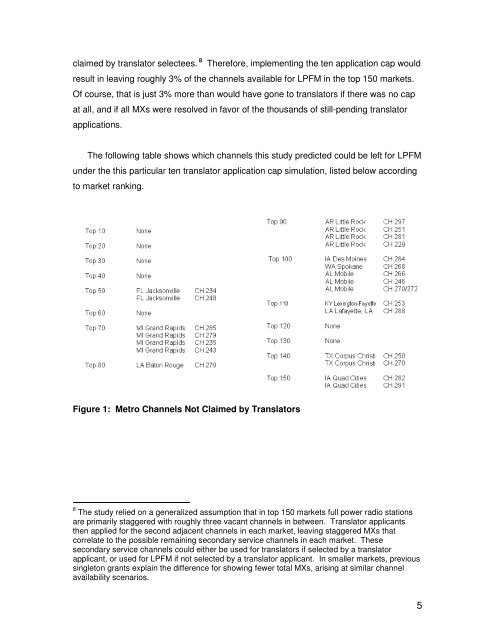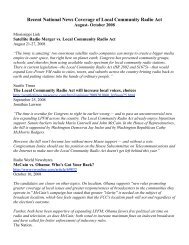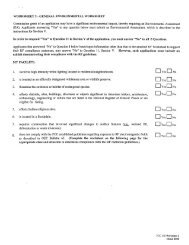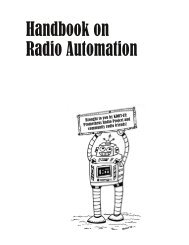- Page 2 and 3: Translator Study with Commentary De
- Page 4 and 5: All the pending applications were r
- Page 8 and 9: cap of three (once again, using the
- Page 10 and 11: of possible speculators among singl
- Page 12 and 13: could use four and sell six? What c
- Page 14 and 15: The Cap May Result in Lack of Local
- Page 16 and 17: Appendix This appendix accompanies
- Page 18 and 19: 1 354 BNPFT-20030313ASJ 139360 SOUT
- Page 20 and 21: 1 688 BNPFT-20030317EEC 155835 NEWA
- Page 22 and 23: 1 1427 BNPFT-20030317MOQ 155924 BEA
- Page 24 and 25: 2 293 BNPFT-20030317HCL 156332 SUMM
- Page 26 and 27: 2 1058 BNPFT-20030317CGX 151638 OXN
- Page 28 and 29: 4 502 BNPFT-20030314BQI 140088 PALO
- Page 30 and 31: 6 967 BNPFT-20030317BOZ 144192 HOUS
- Page 32 and 33: 8 10 BNPFT-20030317BCD 151283 ATLAN
- Page 34 and 35: 8 106 BNPFT-20030317EHS 141516 CHES
- Page 36 and 37: 8 144 BNPFT-20030310BKU 138622 LAWN
- Page 38 and 39: 12 580 BNPFT-20030313BHA 144441 NOR
- Page 40 and 41: 15 138 BNPFT-20030314AJU 142850 WIC
- Page 42 and 43: 15 973 BNPFT-20030317FTQ 154781 SOU
- Page 44 and 45: 20 54 BNPFT-20030312AJI 139082 COLO
- Page 46 and 47: 21 1119 BNPFT-20030313AKN 144723 LI
- Page 48 and 49: 26 234 BNPFT-20030314BGA 147916 HES
- Page 50 and 51: 29 753 BNPFT-20030312AAT 142645 NOR
- Page 52 and 53: 32 445 BNPFT-20030317IOS 152892 LAW
- Page 54 and 55: 37 20 BNPFT-20030313AUN 143556 WEST
- Page 56 and 57:
39 625 BNPFT-20030310AXW 141816 GRE
- Page 58 and 59:
44 175 BNPFT-20030310AZP 138689 MCE
- Page 60 and 61:
46 325 BNPFT-20030310AZX 139256 JAC
- Page 62 and 63:
53 1313 BNPFT-20030317IDN 149493 EA
- Page 64 and 65:
58 4 BNPFT-20030317IFQ 156666 KNOXV
- Page 66 and 67:
60 770 BNPFT-20030317CKZ 155645 GRE
- Page 68 and 69:
66 771 BNPFT-20030317FZC 151091 CAL
- Page 70 and 71:
66 1127 BNPFT-20030317ESV 155530 SE
- Page 72 and 73:
68 848 BNPFT-20030314AOX 141973 BEL
- Page 74 and 75:
77 367 BNPFT-20030317ELB 141529 SAL
- Page 76 and 77:
84 635 BNPFT-20030317LXO 154184 HIN
- Page 78 and 79:
91 147 BNPFT-20030317ISQ 156834 SPO
- Page 80 and 81:
96 374 BNPFT-20030314BLS 139444 POR
- Page 82 and 83:
109 50 BNPFT-20030317HWB 150366 AUG
- Page 84 and 85:
121 908 BNPFT-20030314BPM 147869 CA
- Page 86 and 87:
137 187 BNPFT-20030311ADK 138709 PE
- Page 88 and 89:
144 221 BNPFT-20030317CJK 147434 PA
- Page 90 and 91:
open 503 BNPFT-20030317DFY 151686 M
- Page 92 and 93:
156541 ADVANCE MINISTRIES, INC. D/B
- Page 94 and 95:
142965 ALELUYA CHRISTIAN BROADCASTI
- Page 96 and 97:
138807 ARIZONA BOARD OF REGENTS FOR
- Page 98 and 99:
144603 BIG BROADCASTING, INC. WEST
- Page 100 and 101:
141885 BRIGHAM YOUNG UNIVERSITY MIL
- Page 102 and 103:
143934 BURLINGTON COUNTY COLLEGE MO
- Page 104 and 105:
138695 CALVARY CHAPEL OF TWIN FALLS
- Page 106 and 107:
155729 CALVARY CHAPEL OF TWIN FALLS
- Page 108 and 109:
148108 CENTRAL MICHIGAN UNIVERSITY
- Page 110 and 111:
145686 CLEAR CHANNEL BROADCASTING L
- Page 112 and 113:
157057 CONNER MEDIA CORPORATION 1 K
- Page 114 and 115:
151630 COVENANT NETWORK 1 STEELEVIL
- Page 116 and 117:
138708 CSN INTERNATIONAL GLENWOOD I
- Page 118 and 119:
147344 DESERT WEST AIR RANCHERS COR
- Page 120 and 121:
148605 EASTERN SIERRA BROADCASTING
- Page 122 and 123:
148867 EDGEWATER BROADCASTING, INC.
- Page 124 and 125:
150896 EDGEWATER BROADCASTING, INC.
- Page 126 and 127:
151619 EDGEWATER BROADCASTING, INC.
- Page 128 and 129:
152928 EDGEWATER BROADCASTING, INC.
- Page 130 and 131:
154026 EDGEWATER BROADCASTING, INC.
- Page 132 and 133:
138501 EDUCATIONAL COMMUNICATIONS O
- Page 134 and 135:
139574 EDUCATIONAL MEDIA FOUNDATION
- Page 136 and 137:
140722 EDUCATIONAL MEDIA FOUNDATION
- Page 138 and 139:
143267 EDUCATIONAL MEDIA FOUNDATION
- Page 140 and 141:
147471 EDUCATIONAL MEDIA FOUNDATION
- Page 142 and 143:
156334 EDUCATIONAL MEDIA FOUNDATION
- Page 144 and 145:
147365 EDWARD A. SCHOBER HAMMONTON
- Page 146 and 147:
156784 FAMILY STATIONS, INC. CAMDEN
- Page 148 and 149:
147913 FRED HANNEL BELLAIRE MI 285
- Page 150 and 151:
143657 GOLD COAST BROADCASTING LLC
- Page 152 and 153:
148484 GWENDOLYNN TELLEZ SHINER TX
- Page 154 and 155:
139434 HORIZON CHRISTIAN FELLOWSHIP
- Page 156 and 157:
141883 INDIANA COMMUNITY RADIO CORP
- Page 158 and 159:
144949 JOSE J. ARZUAGA FAJARDO PR #
- Page 160 and 161:
152311 KINGSBOROUGH COMMUNITY COLLE
- Page 162 and 163:
139518 LIVING PROOF, INC. 1 SOUTH L
- Page 164 and 165:
153545 MARY V. GUTHRIE LAS VEGAS NV
- Page 166 and 167:
142034 MILLER COMMUNICATIONS, INC.
- Page 168 and 169:
139123 NORTHWESTERN COLLEGE ROCHEST
- Page 170 and 171:
143532 POWELL MEREDITH COMMUNICATIO
- Page 172 and 173:
141948 RADIO ASSIST MINISTRY, INC.
- Page 174 and 175:
145078 RADIO ASSIST MINISTRY, INC.
- Page 176 and 177:
147178 RADIO ASSIST MINISTRY, INC.
- Page 178 and 179:
149144 RADIO ASSIST MINISTRY, INC.
- Page 180 and 181:
150561 RADIO ASSIST MINISTRY, INC.
- Page 182 and 183:
151361 RADIO ASSIST MINISTRY, INC.
- Page 184 and 185:
152357 RADIO ASSIST MINISTRY, INC.
- Page 186 and 187:
154630 RADIO ASSIST MINISTRY, INC.
- Page 188 and 189:
155703 RADIO ASSIST MINISTRY, INC.
- Page 190 and 191:
156705 RAIDER COMMUNICATIONS, INC.
- Page 192 and 193:
155445 ROBERT J. CONNELLY, JR. CLOV
- Page 194 and 195:
143529 SACRED HEART UNIVERSITY, INC
- Page 196 and 197:
158308 SPIRIT COMMUNICATIONS, INC.
- Page 198 and 199:
142898 SUSAN J. SMITH 1 MANSON WA 2
- Page 200 and 201:
142479 THE PRESIDENT& TRUSTEES OF M
- Page 202 and 203:
138726 VCY AMERICA, INC. SIOUX FALL
- Page 204 and 205:
140440 WAY-FM MEDIA GROUP, INC. 1 G
- Page 206 and 207:
156225 WESTERN NORTH CAROLINA PUBLI
- Page 208 and 209:
152107 WYRS BROADCASTING WATERFORD
- Page 210 and 211:
BAPFT20050328APW K266AK ASPEN CO GR
- Page 212 and 213:
BAPFT20060713AAK W237CZ HUDSONVILLE
- Page 214 and 215:
BAPFT20070326ADB K252EH PARK CITY U
- Page 216 and 217:
BAPFT20090922AEO W229BF PINEVILLE K
- Page 218 and 219:
BROADCAST INVESTMENT ASSOCIATES, IN
- Page 220 and 221:
FAMILY ED BROADCASTING CORPORATION
- Page 222 and 223:
KINGSBOROUGH COMMUNITY COLLEGE 59 1
- Page 224 and 225:
PITKIN COUNTY TRANSLATOR DEPARTMENT
- Page 226 and 227:
THE CROMWELL GROUP, INC. OF KENTUCK













